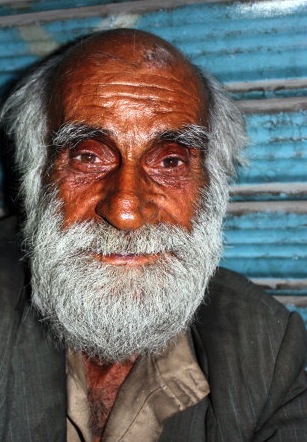 Repost from 2013,
Repost from 2013,  revised
revised  Friday, February 26, 2016 at 02:53PM
Friday, February 26, 2016 at 02:53PM  One day a couple of years ago I hung with Jesus in a dingy hospital room in Columbia, Kentucky. His diabetes was acting up again, which was no surprise because dumpster-divers don’t have the best diet even on a good day. He had already lost a few toes here or there in previous years but this time he was facing the possible loss of his foot. (Don’t worry: I prayed for him, his condition improved, and he ambled away from the hospital on both feet a few days later.)
One day a couple of years ago I hung with Jesus in a dingy hospital room in Columbia, Kentucky. His diabetes was acting up again, which was no surprise because dumpster-divers don’t have the best diet even on a good day. He had already lost a few toes here or there in previous years but this time he was facing the possible loss of his foot. (Don’t worry: I prayed for him, his condition improved, and he ambled away from the hospital on both feet a few days later.)
I’d actually been hanging out with Jesus for a couple of months, but I’m a little slow to recognize old friends.
It started when a guy named Bill came to church. You couldn’t miss him: Bill was a rumple of a man well over six-foot tall, with shaggy, wrinkled clothes. He topped his look off by a snow-white beard and white hair, neither of which had seen a comb in weeks. Everything about him screamed homeless. On his very first visit to church he headed straight toward our coffee bar. Bill’s big frame ambled slowly through our café as the result of his missing toes. The only thing more worrisome than whether he would make it to the coffee bar without falling was the possibly that he would make it to the coffee bar and then try to walk away holding the hot coffee in unsteady hands.
Bill and his coffee made it safely to a table, so I introduced myself. I did so more out of a concern for other’s safety than to make him feel welcome. (When you see people like Bill your first thoughts are about the possibilities of what could go wrong.) I wanted to check him out first-hand. Everything about Bill was confusing.
Where are you from? I used to drive a truck in the Northeast.
How’d you hear about our church? I drove by the other day.
Tell me about your family: I think they’re in Indiana, at least, they were the last time I talked to them.
When the service started Bill worshipped the same way most of us did, except he was taller, shabbier, and scarier than the rest of us. He raised his hands and tilted his head upward. He was content to be in the presence of God and God’s people—even if they were a bit nervous about being in Bill’s presence.
He became a regular each Sunday, and it turned out Bill had an entourage. He took care of Roberta, 60-plus years old, short, loud, and extremely off-putting. She was pretty ugly. One week Bill pulled me aside and apologized for her behavior and explained that her family had thrown her out on the street. He said he was her only protection. They lived together in an abandoned mobile home out in the county. There didn’t seem to be anything awkward about the arrangement because Roberta definitely needed protection, mostly from herself. A few weeks later Bill brought Doug and Maria, a thirty-something couple. They were both embarrassingly overweight. Doug seemed pretty normal but Maria was almost certainly mentally handicapped. Bill told me they were down on their luck and needed a place to stay until they got up on their feet. Bill’s squatter mobile home didn’t have heat or electricity but it was safe and dry, so he opened his home to them.
Bill came to church early and loved to greet people. If they asked what he did for a living he smiled and said simply, “I’m a dumpster-diver.” Which was true: that’s how Bill cared for Roberta and provided shelter for Doug and Maria (although he once complained to me privately that Doug ate too much—especially the fresh produce he regularly scored at the dumpster behind Kroger). The brave people who asked how Bill came into that line of work heard his story about a stroke he suffered while behind the wheel of an 18-wheeler in downtown New York City. It seems Bill lost consciousness and drove the truck into the entrance of a Manhattan office building. That’s when he switched careers.
One day Roberta came to church alone. She told me Bill was in the hospital. Small-town Kentucky hospitals can be pretty depressing places, but when I walked into his room Bill looked up and gave me a smile from his bed. The smile was his big mistake; that’s when I saw through his disguise and figured out I was actually hanging out with Jesus. I tried to play it cool and not let on. Bill asked about my family. He asked how the church was getting along. He put me completely at ease. There in his hospital room he was a gracious host, I was the guest.
I had come to pray for his foot. His circulation had failed. The foot was turning colors and he was likely to lose it above the ankle. He needed healing, but it was difficult praying over his ankle because after all, I was ministering to the Lord of Glory. When we finished praying I asked him if he felt any better. He said, “I’m not worried. It’ll all work out.” And it did. The circulation returned. He was discharged and came back to church just a few more times before he moved on to Indiana. He said he wanted to see his family.
A few months later I received a hand-written letter, blue ink on a notebook page. The ragged little pieces from where the page was torn out of the spiral notebook tickled the fingers of my left hand. Doug and Maria had found public-assisted housing. Roberta was ill and perhaps sick unto death, and Bill was finding riches in the dumpsters of southern Indiana.
He thanked me for the welcome he had received in Kentucky. I sat holding the letter, but I couldn’t recall if I had ever thanked him hanging out with us.
 Monday, December 28, 2015 at 09:05AM
Monday, December 28, 2015 at 09:05AM  Christmas has come and gone. I am in debt so deeply I have no hope of paying back what I owe, but this debt brings me hope and joy. I am in debt to God’s great Incarnational act of love.
Christmas has come and gone. I am in debt so deeply I have no hope of paying back what I owe, but this debt brings me hope and joy. I am in debt to God’s great Incarnational act of love.
Hidden in the North American holiday habit of excess and over-spending is a parable. The bank of Heaven extended me a line of credit so vast it cannot be calculated, and I drew on every bit of the amount. Our great debt to God is love. And like all great debt, the only way to pay it back is a little at a time, each payment a reminder of the grand total.
To stretch this simple metaphor to its ultimate degree, the Bank of Heaven has many locations, currently approaching seven billion on the planet: since all humanity is made in his image, everyone becomes a location where I can present an installment on so happy a debt.
If you have been taught that the only meaning of grace is free-forgiveness you will certainly take issue with this line of thinking. “That’s what grace is all about,” you protest, “we cannot pay the debt of sin, nor should we imagine we could ever earn our way to heaven.” In our day this particular truth is too true, yet I am not talking about sin. I am talking about something as different from sin as water is from sand. I am talking about the Father’s love. If Christmas were only about divine rescue from sin, then the sin-debt—paid in full—would be the end of the issue. When we understand that Christmas is not about our sin but rather God’s great love, we will see what we received at Christmas was an advance upon the love of God.
The economics of the Incarnation turn every business model on its head: “For you know the grace of our Lord Jesus Christ, that though he was rich, yet for your sake he became poor, so that you by his poverty might become rich.” The prudent Apostle Paul warned against the worldly debt but encouraged the debt of love: “Owe no one anything, except to love each other.” The love of God is the currency of Heaven, the coin of our payment to one another.
His genius is not compounding interest, but compounding equity. We repay the love debt with the very substance of the original act of God’s great love. All across the world, the love of God is repaid in acts of kindness done in his name. The effect is ever-increasing love, the source—and the payment—of our joyous debt.
 Monday, December 14, 2015 at 09:15AM
Monday, December 14, 2015 at 09:15AM  Some things hide in plain sight. Others hide behind fancy names. And still others hide among the over-decorated trappings of tradition dressed up as garish holiday cheer. Sometimes it’s all three.
Some things hide in plain sight. Others hide behind fancy names. And still others hide among the over-decorated trappings of tradition dressed up as garish holiday cheer. Sometimes it’s all three.
The truth about Christmas is that God became a man. The transcendent Creator of the Universe, the One who sits outside his creation submerged himself in the work of his hands. The Playwright walked on stage in the middle of the show. The Coach became a player. The King became a commoner.
He wasn’t a Poser, pretending to be something other than what he was: he was born, and he grew; he came of age and took his place among us; he embraced his purpose and fulfilled it completely. He wasn’t slumming among us like some impostor: he laughed, he cried, he sweat. When we struck him, he bled. When we pierced him, he died.
Something as grand and wonderful as Christmas certainly has many sub-themes: peace on earth, goodwill toward men, hope for tomorrow, salvation for all, and the fulfillment of promise. We should listen to each line of the symphony and enjoy the beauty of each one. Put them all together than they point to the grand melody, that God became man.
When God became man, he demonstrated how to be human. His life, in the person of Jesus Christ, is the model of all lives, everywhere and in every time. Men from every age can look to Jesus has example. Women from every culture can discover fullness in him. God did not cheat the game by walking through life untouched by the trouble we face. He faced the same troubles we have faced, and indeed more, because to his trouble was added unique rejection of all mankind toward him. Humanity had never seen his type before, and this magnificent encounter between God and us resulted in our rejection of him, while he responded with un-rejectable love.
You can have your shepherds, wise men, angels, and mangers. For me, the grandeur of Christmas is captured in the gospel, which places its cards on the table right from the start:
The true light that gives light to everyone was coming into the world. He was in the world, and though the world was made through him, the world did not recognize him. He came to that which was his own, but his own did not receive him. Yet to all who did receive him, to those who believed in his name, he gave the right to become children of God— children born not of natural descent, nor of human decision or a husband’s will, but born of God. The Word became flesh and made his dwelling among us. We have seen his glory, the glory of the one and only Son, who came from the Father, full of grace and truth. (John 1:9-14)
John tells us plainly, “No one has ever seen God, but the one and only Son, who is himself God and is in closest relationship with the Father, has made him known.” (John 1: 18)
What does God look like? He looks like Jesus. The Father spoke himself in Jesus. The countless words of every generation, arrayed in questions, arguments, songs and poems have been answered in the single Word, Jesus. The same Word that spoke creation into being speaks life into us today.
When God became man, it looked like Jesus, and he still does. If we aspire to the presence of God in our everyday, we are really aspiring to Jesus. Because he is human we have the hope of his likeness. Because he is God, we have the certainty of his promise. All other messages flow from the Word made flesh. He was announced as Emmanuel, and he continues to reveal himself as such: God is forever with us because he has forever pitched his tent in the person of Jesus, the true lesson of Christmas.